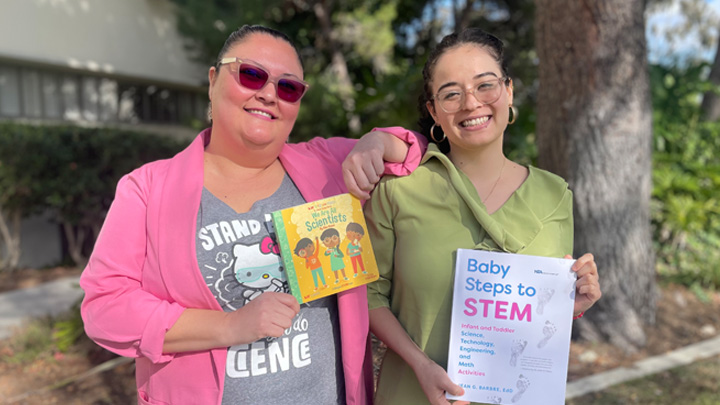Faculty team up to give early childhood bilingual educators a crash course in STEM

Wendy Ochoa views young children as natural scientists. They’re born curious and observant — always eager to learn how the world around them functions.
“They want to learn and they try things over and over, just like scientists do,” said the assistant professor in the San Diego State University Department of Child and Family Development (CFD). “If they throw something on the floor, the adult looks at them and picks it up — then they laugh and do it again.”
But too often, children from racially and linguistically minoritized communities don’t find their innate curiosity about science, technology, engineering and mathematics (STEM) concepts cultivated in early childhood education settings.
"If you just open up a science textbook,” said Melissa A. Navarro Martell, associate professor in the Department of Dual Language and English Learner Education, “you see who's represented right away.”
Navarro Martell and Ochoa have teamed up to address that.
Funded by the Mexican American Opportunity Foundation, Navarro Martell and Ochoa are set to launch “Jugando y Aprendiendo: ¡Somos Científicos!” (Spanish for “Playing and Learning: We are Scientists!”) — a series of professional development workshops in STEM for early childhood dual language teachers. The idea is to equip local educators with the pedagogical tools they need to introduce STEM in culturally- and linguistically-relevant ways.
"Our goal is to help people empower themselves and really convey to families and preschools that they have a lot of assets that they can use to teach STEM,” Ochoa explains.
Built around Next Generation Science Standards, the series will consist of four-hour sessions held over four days starting March 22, with the curriculum being offered in both English and Spanish. Dozens of educators are expected to participate, primarily from the South Bay community of Chula Vista, though teachers from as far away as Orange County are expected to attend.
The partnership between faculty specializing in bilingual STEM education and early childhood reflects both California’s move to require early childhood teacher credentialing as well as the state’s persistent need for bilingual educators at all grade levels.
Both Navarro Martell, an expert on bilingual and STEM education, and Ochoa, whose work centers on the wellbeing of young children from minoritized groups by leveraging their families’ funds of knowledge, expressed excitement for the collaboration — but even more so for the chance to make a difference for educators.
"So far, we’ve worked really well together,” Ochoa said. “Even though our fields are different, a lot of our philosophies about how to work with communities overlap. I think too often those relationships between researchers and the community tend to be one sided, benefitting us (as researchers). What excites me about this is building mutually-beneficial relationships, especially with the early childhood centers.”
Ochoa notes that there is very little focus on STEM education in early childhood, and what emerging programs do exist tend to be English-only. She stressed the importance of leveraging the assets that exist within students’ homes and communities. The sessions aim to help teachers embed families’ “funds of knowledge” into their STEM curriculum.
Each workshop will start with hands-on activities before delving into discussions of theory and research about STEM and translanguaging (the ability to move fluidly between languages). Teachers will be shown how to lead activities using items commonly found in the home. In one activity, kids design maracas using water bottles, dried beans and rice. Children then shake the instruments along with common Spanish-language nursery rhymes, learning about patterns, repetition and sound in the process.
"By the time they leave from the four days, they will have sample lesson plans that they can continue teaching and share with people,” Navarro Martell said. “We’re developing these materials ourselves, and we’re developing them in both English and in Spanish. We are also going to talk about why we are not policing language."

